TEC 2016: Technology. Entrepreneurship. Creativity.
Friday, February 5, 2016
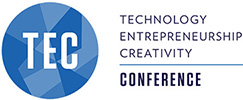 TEC Conference is an annual, one-day conference designed to showcase some of the exciting work being done in technology, entrepreneurship, and creative spaces. Serving as the culminating event in iFest's week of activities, TEC provides an opportunity for students, researchers, entrepreneurs, policymakers, and community partners to meet, share ideas, and collaborate. 2016 marks the third year for TEC and remains a free event that is open to the public, due to the generous support of our sponsors.
TEC Conference is an annual, one-day conference designed to showcase some of the exciting work being done in technology, entrepreneurship, and creative spaces. Serving as the culminating event in iFest's week of activities, TEC provides an opportunity for students, researchers, entrepreneurs, policymakers, and community partners to meet, share ideas, and collaborate. 2016 marks the third year for TEC and remains a free event that is open to the public, due to the generous support of our sponsors.
![]()
Schedule of TEC Talks
(9:30AM) Ben Balter, Government Evangelist, GitHub
"The Technology is the easy part: Using technology as a vehicle for organization change"
 When attempting to inject innovation in to large organizations, the technology is the easy part. It's not a question of if a large enterprise can stand up an e-commerce site, or if it can bring a new mobile app to market. Those are long-solved technical challenges with well-established industry playbooks. Instead, the challenge almost always overwhelmingly lies in overcoming organizational inertia, and in fostering an innovation culture that will support (and outlive) your efforts. Looking back at six years of catalyzing technical change within and across government, Ben Balter, Government Evangelist for GitHub, the world's largest open source code repository, will examine the bureaucratic "immune system" innate to large organizations, and how entrepreneurship and the hacker ethic can be used to overcome it.
When attempting to inject innovation in to large organizations, the technology is the easy part. It's not a question of if a large enterprise can stand up an e-commerce site, or if it can bring a new mobile app to market. Those are long-solved technical challenges with well-established industry playbooks. Instead, the challenge almost always overwhelmingly lies in overcoming organizational inertia, and in fostering an innovation culture that will support (and outlive) your efforts. Looking back at six years of catalyzing technical change within and across government, Ben Balter, Government Evangelist for GitHub, the world's largest open source code repository, will examine the bureaucratic "immune system" innate to large organizations, and how entrepreneurship and the hacker ethic can be used to overcome it.
About Ben Balter: TEC 2016 will feature keynote presenter, Ben Balter, government evangelist at GitHub. In his role at GitHub, the world’s largest software development network, Ben leads efforts to encourage adoption of open source philosophies, making all levels of government better, one repository at a time. Balter was named one of the top 25 most influential people in government and technology and Fed 50’s Disruptor of the Year, and is described by the U.S. chief information officer as one of “the baddest of the badass innovators.”
(10:30AM) Shawn Patton, Design Director, Schell Games
"Virtual Reality: From Imagination to Realization"
 Shawn has been designing and directing projects at Schell Games for the past twelve years. While these diverse projects have included online games, offline toys, in-person theme park attractions, transformational worlds, and pure mobile fun, his recent obsession is creating immersive Virtual Reality experiences. He has worked with Sony's Playstation VR, HTC & Valve's Vive, and Facebook & Oculu's Rift. Whether for children or adults, VR has the capability to engage players in ways never before possible and Shawn is happy to be a part of it.
Shawn has been designing and directing projects at Schell Games for the past twelve years. While these diverse projects have included online games, offline toys, in-person theme park attractions, transformational worlds, and pure mobile fun, his recent obsession is creating immersive Virtual Reality experiences. He has worked with Sony's Playstation VR, HTC & Valve's Vive, and Facebook & Oculu's Rift. Whether for children or adults, VR has the capability to engage players in ways never before possible and Shawn is happy to be a part of it.
About Shawn Patton: Shawn has been designing and directing projects at Schell Games for the past twelve years. While these diverse projects have included online games, offline toys, in-person theme park attractions, transformational worlds, and pure mobile fun, his recent obsession is creating immersive Virtual Reality experiences. He has worked with Sony's Playstation VR, HTC & Valve's Vive, and Facebook & Oculu's Rift. Whether for children or adults, VR has the capability to engage players in ways never before possible and Shawn is happy to be a part of it. In his TEC 2016 talk, "Virtual Reality: From Imagination to Realization," Patton will discuss how 2016 is finally the year of consumer Virtual Reality. Come behind the scenes with Shawn Patton as he explores what makes a great VR experience using examples from the award winning VR escape the room game: "I Expect You To Die".
(11:05AM) Salwa Ismail, Head of Library Information Technology, Georgetown University
"Library Technology at the Intersection of Scholarship and Innovation"
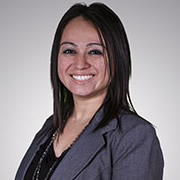 As institutions of higher education explore innovative ways to deliver valued education into the future beyond dumping skills in students’ laps and laptops, they are beginning to actively experiment with new modes of pedagogy and scholarship. Libraries have an active and innovative role to play as these modes of pedagogy and scholarship emerge and evolve. Libraries have always regarded information and education as a public good, and as we explore open technology initiatives, we consider collaboration and conversation with our stakeholders on the use of these open technologies to be tenets of education’s accessibility. This presentation is a conversation on what and how Libraries have innovated and created thus far to support these landscape changes, as well as what opportunities we as library and education professionals have to advance library and open technology in the short and long term. While the conversation will focus on the broad landscape, individual ideas and projects will be highlighted to support the ideas presented. These examples will discuss the use of individual systems and projects to illustrate issues such as: the diversity, stability and resilience of the emerging library technology landscape; the changing loci of innovation and expertise in libraries and the digital technologies they offer; the shifting role of standards in technology and Libraries; and the implications of shifts in the rate of innovation and deployment of innovative technology for library offerings and services.
As institutions of higher education explore innovative ways to deliver valued education into the future beyond dumping skills in students’ laps and laptops, they are beginning to actively experiment with new modes of pedagogy and scholarship. Libraries have an active and innovative role to play as these modes of pedagogy and scholarship emerge and evolve. Libraries have always regarded information and education as a public good, and as we explore open technology initiatives, we consider collaboration and conversation with our stakeholders on the use of these open technologies to be tenets of education’s accessibility. This presentation is a conversation on what and how Libraries have innovated and created thus far to support these landscape changes, as well as what opportunities we as library and education professionals have to advance library and open technology in the short and long term. While the conversation will focus on the broad landscape, individual ideas and projects will be highlighted to support the ideas presented. These examples will discuss the use of individual systems and projects to illustrate issues such as: the diversity, stability and resilience of the emerging library technology landscape; the changing loci of innovation and expertise in libraries and the digital technologies they offer; the shifting role of standards in technology and Libraries; and the implications of shifts in the rate of innovation and deployment of innovative technology for library offerings and services.
About Salwa Ismail: Salwa is the head of Library Information Technology at Georgetown University. Prior to joining Georgetown, she was the head of the Digital Library at Florida Atlantic University Libraries. Her current portfolio includes library servers and systems, library applications, library computing infrastructure, library web services, library digital initiatives and services, and library ILS & discovery services. Ismail received her MLIS degree from Florida State University and has an MBA from Florida Atlantic University. In 2015, she was selected as a Library Mover and Shaker by Library Journal for being a digital driver at Georgetown University Library. In 2015, she was also awarded the inaugural President’s Excellence Award for her contributions to the Georgetown University and her profession. Ismail is very passionate about defining how libraries, through technological advancement and innovation of library technology and digital services, can play a role as hubs and agents of research and scholarship as higher education transforms in a landscape shifted by globalization and technology.
(1:00PM) Kevin Campbell, Chief Technology Officer, Omnyx
"Omnyx—Transforming Cancer Care through Digital Pathology"
 A joint venture between GE Healthcare and UPMC (University of Pittsburgh Medical Center), Omnyx is committed to transforming cancer care and empowering patient choice through advances in digital pathology. The two organizations began a two year collaboration process in 2006 and founded the company in 2008. During this time Omnyx worked with more than 30 thought leading pathologists from 13 academic medical centers and research laboratories around the globe–including hands-on input from UPMC pathologists. Additionally, Omnyx conducted extensive research with The Human-Computer Interaction Institute at Carnegie Mellon University that closely studied pathologists’ processes, culture and information sources, along with interactions with peers and other hospital colleagues, including the interaction with and importance of the histology process.
A joint venture between GE Healthcare and UPMC (University of Pittsburgh Medical Center), Omnyx is committed to transforming cancer care and empowering patient choice through advances in digital pathology. The two organizations began a two year collaboration process in 2006 and founded the company in 2008. During this time Omnyx worked with more than 30 thought leading pathologists from 13 academic medical centers and research laboratories around the globe–including hands-on input from UPMC pathologists. Additionally, Omnyx conducted extensive research with The Human-Computer Interaction Institute at Carnegie Mellon University that closely studied pathologists’ processes, culture and information sources, along with interactions with peers and other hospital colleagues, including the interaction with and importance of the histology process.
About Kevin: Kevin Campbell joined Omnyx in 2015 as Chief Technology Officer. Omnyx is a joint venture between GE Healthcare and UPMC that is committed to transforming cancer care and empowering patient choice through advances in digital pathology. Bringing over 25 years of experience in product development and automation experience, Kevin joined Omnyx from GE Healthcare IT where he was Chief Technology Officer for Clinical Business Solutions. In this role, he led development for the Centricity Portfolio of Electronic Medical Record, Quality Reporting, Revenue Cycle, and EDI software solutions. Prior to this, Kevin was with GE Transportation for seven years engaged in the development, deployment and marketing of rail/transit operation and optimization solutions. Kevin held several roles including Director of Network Optimization Solutions, Global Product Leader – Office and Communications, and Executive – Software Engineering.
(1:35PM) Meredith Grelli, Co-Founder & Co-Owner, Wigle Whiskey
"You Say Stop and I Say Go, Go, Go"
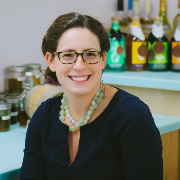 How do entrepreneurs infuse their new product development efforts with successful innovation? Meredith will discuss the two method framework that she has created at Wigle to breed relentless innovation, filling the company’s new product pipeline with compelling services, award-winning products and sell-out programs to meet consumers needs and grow the business each year.
How do entrepreneurs infuse their new product development efforts with successful innovation? Meredith will discuss the two method framework that she has created at Wigle to breed relentless innovation, filling the company’s new product pipeline with compelling services, award-winning products and sell-out programs to meet consumers needs and grow the business each year.
About Meredith: Meredith is co-founder and co-owner of Wigle Whiskey, Pittsburgh's first distillery since Prohibition. Since opening in March 2012, Wigle Whiskey has worked to restore Pittsburgh’s legacy of rye whiskey. Wigle spirits are distributed across the mid-atlantic and east coast and have won a host of medals including Best Craft Rye Whiskey in America, making Wigle the most awarded craft whiskey distillery in the United States. Grelli leads the charge on marketing, including distribution, new product development, PR, and partnerships. She also teaches new product development in Chatham University's Master of Food Studies Program, as well as marketing and entrepreneurship courses for Chatham’s MBA and professional programs.
(2:10PM) Sera Linardi, Assistant Professor, Pitt Graduate School of Public and International Affairs
"Violence and Cell Phone Communication: Behavior and Prediction in Cote D'Iviore"
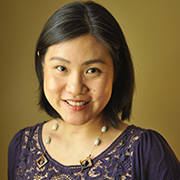 We investigate the relationship between low-level incidents of political violence and communication patterns seven months after the 2012 Ivorian Civil War using network traffic from all of Orange Telecom’s Cote d’Ivoire cell towers and 500,000 randomly sampled cell phone subscribers. We first show that in the days preceding small violent incidents, mobile phone call volumes increase by 10% and the number of cell phones that are active increases by 6%, while the length of average calls decreases by 4%. These unique communication patterns attenuate as the distance from violence increase and strengthen when incidents with no fatalities are excluded. We then use machine learning techniques to explore whether these changes can predict the day and location of violent events. The addition of cell phone data to base models appear to improve our ability to predict violent events at very fine spatial and temporal resolution.
We investigate the relationship between low-level incidents of political violence and communication patterns seven months after the 2012 Ivorian Civil War using network traffic from all of Orange Telecom’s Cote d’Ivoire cell towers and 500,000 randomly sampled cell phone subscribers. We first show that in the days preceding small violent incidents, mobile phone call volumes increase by 10% and the number of cell phones that are active increases by 6%, while the length of average calls decreases by 4%. These unique communication patterns attenuate as the distance from violence increase and strengthen when incidents with no fatalities are excluded. We then use machine learning techniques to explore whether these changes can predict the day and location of violent events. The addition of cell phone data to base models appear to improve our ability to predict violent events at very fine spatial and temporal resolution.
About Sera: Sera is an assistant professor of economics at the Graduate School of Public and International Affairs (GSPIA) at the University of Pittsburgh. She received a BS in Computer Science from Stanford University and a PhD in Social Science at the California Institute of Technology. Prior to her academic career, she was a computer scientist at Adobe Systems in San Jose, CA, working on PDF technology. Linardi uses behavioral and experimental methods to study issues in human and social services, such as the provision of donation and volunteers, aggregation of dispersed information, and the reaction of the recipient population.
(3:00PM) Bobby Schnabel, CEO, Association of Computing Machinery (ACM)
"ACM Overview and Strategic Priorities"
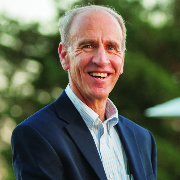 This will be an interactive discussion of ACM programs and strategic priorities, intended to solicit comments, suggestions and discussion from the audience. We will give an overview of ACM’s scope, conferences and publications, international activities, and activities that support the broad computing community in areas including diversity, education and policy. Then we will present a summary of ACM strategic priorities including: becoming a fully international society; continually evolving to reflect the latest technical developments and applications in computing; strengthening ties with the entrepreneurial community; playing a broad leadership role in diversity; providing increased value to computing practitioners; and continually evolving its modes of communication with ACM members and the world.
This will be an interactive discussion of ACM programs and strategic priorities, intended to solicit comments, suggestions and discussion from the audience. We will give an overview of ACM’s scope, conferences and publications, international activities, and activities that support the broad computing community in areas including diversity, education and policy. Then we will present a summary of ACM strategic priorities including: becoming a fully international society; continually evolving to reflect the latest technical developments and applications in computing; strengthening ties with the entrepreneurial community; playing a broad leadership role in diversity; providing increased value to computing practitioners; and continually evolving its modes of communication with ACM members and the world.
About Bobby: Bobby is CEO of the Association for Computing Machinery (ACM), the oldest and largest society of computing professionals and students. Prior to beginning as CEO of ACM in Nov. 2015, Schnabel was dean of the School of Informatics and Computing at Indiana University (IU) from 2007-2015. In this position he led a multi-campus school of over 150 faculty and 3500 students at the Bloomington and Indianapolis campuses, including undergraduate and graduate programs in computer science and informatics, and graduate programs in data science, information science, and library science. From 2009-2010, he also served as interim IU vice president for research.